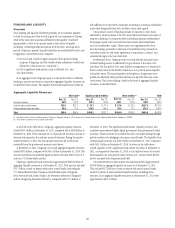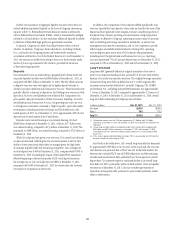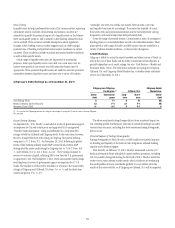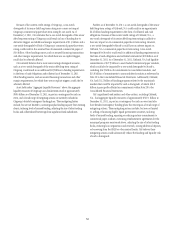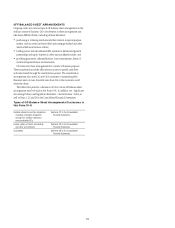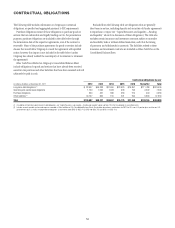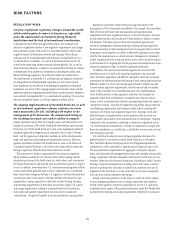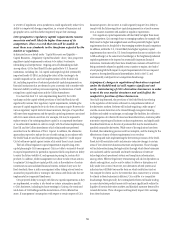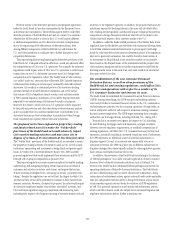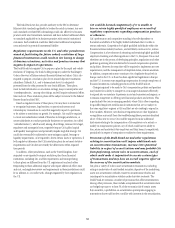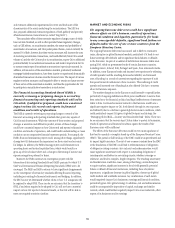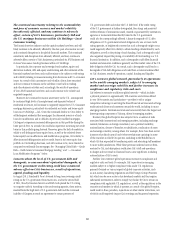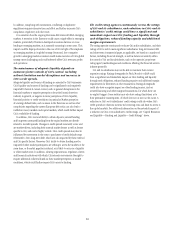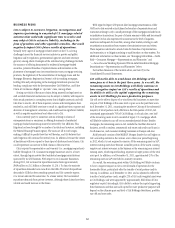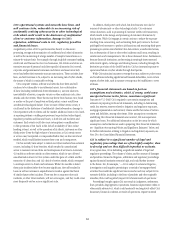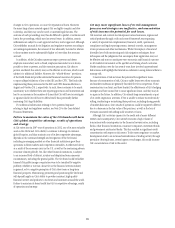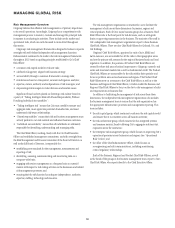Citibank 2011 Annual Report Download - page 79
Download and view the complete annual report
Please find page 79 of the 2011 Citibank annual report below. You can navigate through the pages in the report by either clicking on the pages listed below, or by using the keyword search tool below to find specific information within the annual report.57
Reforms similar to the derivatives provisions and proposed regulations
under the Dodd-Frank Act are also contemplated in the European Union
and certain other jurisdictions. These reforms appear likely to take effect
after the provisions of the Dodd-Frank Act and, as a result, it is uncertain
whether they will be similar to those in the U.S. or will impose different
or additional requirements on Citi’s derivative activities. Complications
due to the sequencing of the effectiveness of derivatives reform, both
among different components of the Dodd-Frank Act and between the
U.S. and other jurisdictions, could give rise to further disruptions and
competitive dislocations.
The proposed regulations implementing the derivatives provisions of the
Dodd-Frank Act, if adopted without modification, would also adversely affect
the competitiveness of Citi’s non-U.S. operations. For example, the proposed
regulations would require some of Citi’s non-U.S. operations to collect more
margin from its non-U.S. derivatives customers than Citi’s foreign bank
competitors may be required to collect. The Dodd-Frank Act also contains
a so-called “push-out” provision that will prevent FDIC-insured depository
institutions from dealing in certain equity, commodity and credit-related
derivatives. Citi conducts a substantial portion of its derivatives-dealing
activities through its insured depository institution and, to the extent
that certain of Citi’s competitors already conduct such activities outside
of FDIC-insured depository institutions, Citi would be disproportionately
impacted by any restructuring of its business for push-out purposes.
Moreover, the extent to which Citi’s non-U.S. operations will be impacted
by the push-out provision and other derivative provisions remains unclear,
and it is possible that Citi could lose market share or profitability in its
derivatives business or client relationships in jurisdictions where foreign
bank competitors can operate without the same constraints.
The proposed restrictions imposed on proprietary trading
and funds-related activities under the “Volcker Rule”
provisions of the Dodd-Frank Act could adversely impact
Citi’s market-making activities and may cause Citi to
dispose of certain of its investments at less than fair value.
The “Volcker Rule” provisions of the Dodd-Frank Act are intended to restrict
the proprietary trading activities of institutions such as Citi, as well as such
institutions’ sponsorship and investment in hedge funds and private equity
funds. In October 2011, the Federal Reserve Board, OCC, FDIC and SEC
proposed regulations that would implement these restrictions and the CFTC
followed with its proposed regulations in January 2012.
The proposed regulations contain narrow exceptions for market-making,
underwriting, risk-mitigating hedging, certain transactions on behalf of
customers and activities in certain asset classes, and require that certain
of these activities be designed not to encourage or reward “proprietary risk
taking.” Because the regulations are not yet final, the degree to which Citi’s
activities in these areas will be permitted to continue in their current form
remains uncertain. Moreover, if adopted as proposed, the rules would require
an extensive compliance regime around these “permitted” activities, and
Citi could incur significant ongoing compliance and monitoring costs,
including with respect to the frequent reporting of extensive metrics and risk
analytics, to the regulatory agencies. In addition, the proposed rules and any
restrictions imposed by final regulations in this area will also likely affect
Citi’s trading activities globally, and thus will impact it disproportionately in
comparison to foreign financial institutions that will not be subject to the
Volcker Rule with respect to their activities outside of the U.S.
In addition, under the funds-related provisions of the Volcker Rule, bank
regulators have the flexibility to provide firms with extensions allowing them
to hold their otherwise restricted investments in private equity and hedge
funds for some time beyond the statutory divestment period. If the regulators
elect not to grant such extensions, Citi could be forced to divest certain of
its investments in illiquid funds in the secondary market on an untimely
basis. Based on the illiquid nature of the investments and the prospect that
other industry participants subject to similar requirements would likely be
divesting similar assets at the same time, such sales could be at substantial
discounts to their fair value.
The establishment of the new Consumer Financial
Protection Bureau, as well as other provisions of the
Dodd-Frank Act and ensuing regulations, could affect Citi’s
practices and operations with respect to a number of its
U.S. Consumer businesses and increase its costs.
The Dodd-Frank Act established the Consumer Financial Protection Bureau
(CFPB). Among other things, the CFPB was given rulemaking authority
over most providers of consumer financial services in the U.S., examination
and enforcement authority over the consumer operations of large banks, as
well as interpretive authority with respect to numerous existing consumer
financial services regulations. The CFPB began exercising these oversight
authorities over the largest banks, including Citibank, N.A., during 2011.
Because this is an entirely new agency, the impact on Citi, including
its retail banking, mortgages and cards businesses, is largely uncertain.
However, any new regulatory requirements, or modified interpretations of
existing regulations, will affect Citi’s U.S. Consumer business practices and
operations, potentially resulting in increased compliance costs. Furthermore,
the CFPB represents an additional source of potential enforcement or
litigation against Citi and, as an entirely new agency with a focus on
consumer protection, the CFPB may have new or different enforcement or
litigation strategies than those typically utilized by other regulatory agencies.
Such actions could further increase Citi’s costs.
In addition, the provisions of the Dodd-Frank Act relating to the doctrine
of “federal preemption” may allow a broader application of state consumer
financial laws to federally chartered institutions such as Citibank, N.A.
Moreover, the Dodd-Frank Act eliminated federal preemption protection for
operating subsidiaries of federally chartered institutions. The Dodd-Frank
Act also codified existing case law which allowed state authorities to bring
certain types of enforcement actions against national banks under applicable
state law and granted states the ability to bring enforcement actions and to
secure remedies against national banks for violation of CFPB regulations
as well. This potential exposure to state lawsuits and enforcement actions,
which could be extensive, could also subject Citi to increased litigation and
regulatory enforcement actions, further increasing costs.


